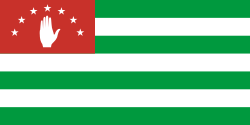This article needs to be updated.(July 2025) |
 | |
| Currency | Russian Ruble |
|---|---|
| Statistics | |
| GDP | $439.6 million (2020) |
GDP per capita | $1,795 (2020) |
All values, unless otherwise stated, are in US dollars. | |
The economy of Abkhazia is heavily integrated with the economy of Russia and uses the Russian ruble as its currency. Since the 2008 South Ossetia war and Russia's recognition of Abkhazia's independence, the region has experienced modest economic growth largely supported by Russian financial aid. As of 2021, 43.6% of Abkhazia’s state budget was funded by aid from Russia, while the remainder came from local revenues. [1] [2]
Contents
- History
- Tourism
- Transport
- Agriculture
- Electricity generation
- Trade
- Foreign investment
- Challenges
- References
Economic development is hindered by the unresolved state-political status of the republic. One of the main problems is the lack of foreign investment. [3]